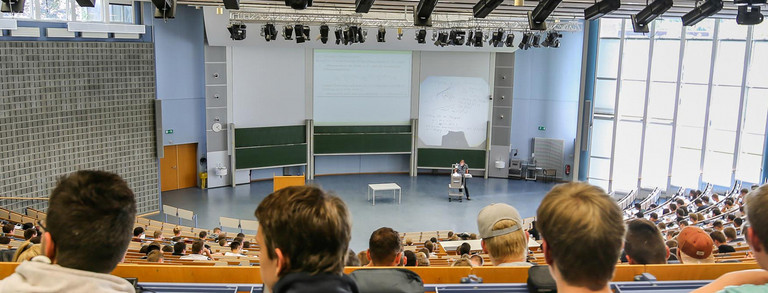Master (1 subject)
The Master’s degree program in Religion and Politics enables students to address and understand the relationship between the spheres of religion, society, and politics and the challenges that result from the complex field of tension, and to develop interdisciplinary approaches to solutions.
to the degree program Religion, Ethics, and Politics (Master of Arts (M.A.))
The two-semester Master’s degree program offers a compact course for journalists with leadership ambitions as well as for those who want to delve deeper into research on science journalism. In addition to empirical social research, the program includes editorial management and a leadership seminar. The following subjects are available as a second major: Medical journalism & life sciences, physics, technical journalism and data journalism.
to the degree program Science Journalism (Master of Arts (M.A.))
In the Master’s degree Sociology, our department profile "Life in Transformation" is deepened in various areas: What does the future of work look like? Can today’s standard of living and justice for future generations be reconciled (keyword sustainability)? What do mobility patterns look like in different countries and regions, from commuting to migration? What challenges - not only for pensions and care, but also, for example, for housing or education - do aging societies bring with them?
The Master’s degree program qualifies students for the increasing demand in professional practice for planning know-how with a sound scientific foundation. It teaches them the ability to organize and manage planning projects at all planning and decision-making levels as well as to lead interdisciplinary working groups. Together with a Bachelor’s degree in a relevant subject, the Master’s degree additionally permits graduates to commence a traineeship in urban development within the civil service.
to the degree program Spatial Planning (Master of Science (M.Sc.))
SPRING stands for Spatial Planning for Regions in Growing Economies and is a two-year Master’s degree program that addresses current spatial planning topics in developing and emerging countries. SPRING students discuss, for example, the challenges of rapid urban growth, reflect on the conflict between environmental protection and economic development, develop concepts to improve transport systems or define strategies to cope with the impacts of climate change.
Today, new knowledge in science, economics, management, and technology is created almost exclusively from large quantities of complex data. The ability to process such data competently and good academic training in this area are in demand in the job market. The proper handling of patient or customer data, share prices and returns, and weather or climate information is well paid and increasingly in demand.
to the degree program Statistics (Master of Science (M.Sc.))
The Sustainable Energy Systems program prepares students for work in the broad field of energy system transformation towards a climate-neutral, economic and supply-secure future. The main technical perspective targets the transition of the electrical power system based on renewable energy. Knowledge of its future design is supplemented by competencies in sustainability and digitalization for smart grids and markets.
to the degree program Sustainable Energy Systems (Master of Science (M.Sc.))
Important facts about Master's programs (1-subject)
- The master's degree is the second qualifying university degree. As a rule, a bachelor's degree has already been successfully completed in advance.
- The standard period of study in the Master's program is at least one and at most two years.
- Depending on the course of study, TU Dortmund University awards the degrees Master of Science (M.Sc.) and Master of Arts (M.A.).
- Within the scope of the 1-subject Master's degree, you will study one course of study.
- The Master's degree enables you to pursue a doctorate.





![[Translate to English:] Partner Four hands are holding the green logo of TU Dortmund University](/storages/tu_website/_processed_/1/d/csm_Partner_Nicole_Rechmann_KW_670eba0154.jpg)




![[Translate to English:] Forschung An apparatus with tubes in a laboratory](/storages/tu_website/_processed_/0/c/csm_Forschung_Juergen_Huhn_4fa3153b51.jpg)
![[Translate to English:] Studium Five students are sitting in a lecture hall. They are talking to each other.](/storages/tu_website/_processed_/c/9/csm_Studium_FelixSchmale_dbdbfb0dd7.jpg)





